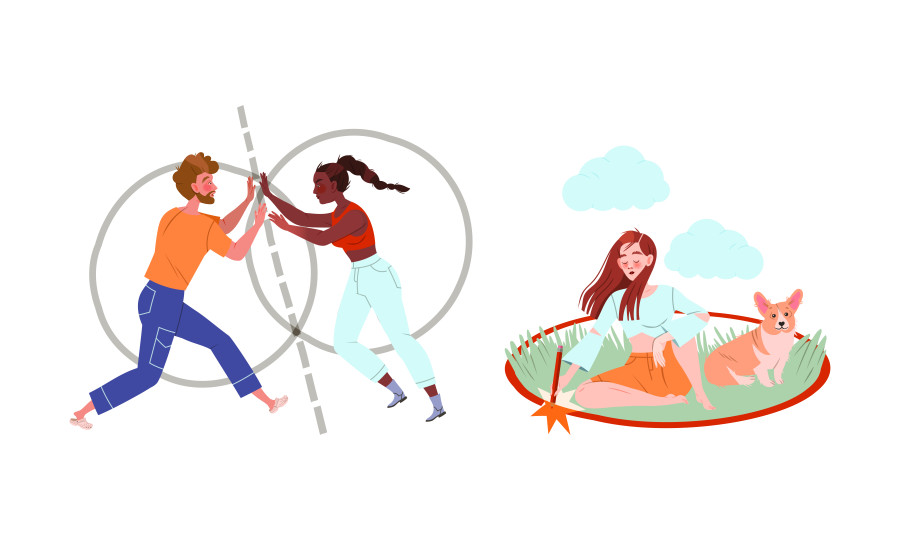Culture & Lifestyle
Why setting boundaries matters
Boundaries help build a path for clear communication and do away with past feelings of resentment and bitterness.
Tashi Gurung
I have always struggled with ensuring boundaries in my practice as a counselling psychologist. Though boundaries are one of the essential components we learn during our training, I have frequently found myself in situations where I am too accommodating and compromising.
For example, in the early years of my practice, a client who had recently gone through a breakup wanted to call their ex-partner in the midst of a session. The client wanted me to mediate their conversation. Surprisingly, I agreed. Fortunately, the ex-partner didn’t answer the call, but after discussing the matter with my supervisor, I found out where I was lacking. I realised I was hesitant to say NO when someone was demanding or adamant.
Time and again, I unconsciously find myself agreeing to certain demands that go against the therapeutic experience. Especially during my experience working in a school, I felt I had to oblige the parents/teachers with the young students’ confidential information, as these adults had referred them for counselling.
With enough supervision and my own counselling, I realised that I needed to acknowledge my own power as a therapist and assert my worth. Only when I did that, I realised that it is actually beneficial in the therapeutic experience. With a good trusting relationship and good intentions, clients—at times—need to be confronted and told about the process and how the process within reason is actually beneficial for them.
With this insight, I parlayed this into my personal life as well. I learned the value of expressing myself with my close ones. When I do that, it actually builds a path for clear communication and do away with past feelings of resentment, anger, and bitterness. When anyone maintains a healthy boundary, a clear expectation is set: what kind of behaviour I accept from others and what others can expect from my own.
Almost any aspect of our life can be improved by setting good boundaries. For example, setting a limit on monthly spending or perhaps not lending money to even closed ones. Another factor can be the concept of personal space and touch. When it comes to touch, we are not taught about it as much during our earlier years, and hence we do not know how much touch is actually comfortable for us.
Acknowledging and being aware of our own emotions and feelings can be a good start on where we need to set boundaries. Often we find ourselves feeling uncomfortable or struggling but very unsure why. When we spend some alone time reflecting on our emotions and feelings, we start to identify what is good for us and what s not. Once we become aware, we get a better idea of boundaries that need to be set.
Oftentimes, it can become difficult to introduce these new boundaries to already pre-existing relationships. People might feel blindsided and assume that we have “changed”. So the ideal way to initiate this change can be to start small and slow. As we start to move along, we can modify and adapt according to the situation. Regarding new relationships we build with people, it is always beneficial to maintain these boundaries from the onset.
As we communicate, it does not always need to be confrontational. It can be as simple as subtly laying out our concerns if someone consistently oversteps our boundaries. For example, if we have a friend who tends to call us incessantly to vent, we can send them a text message to tell them, “I am busy at the moment, and I will call you when I am free to talk”.
Changing the narrative we have about ourselves is also very beneficial for the process. In my own counselling sessions, realising my self-worth was one of the primary focuses. I was able to show myself the basic concept of self-love. When we change the inner monologue from feeling worthless and undeserving to valuing ourselves, we will no longer feel guilty about setting boundaries. We start to prioritise our mental health.
Also, it is essential to respect other people’s boundaries—no matter how different they might be from us. We can be aware of other people's boundaries by just being sensible and observant of other people’s reactions and comments. In fact, it can just be even more straightforward. We can ask them about it. Or discover it together.
In the midst of this process, it is important to keep in mind to keep things easy. We might tend to get swayed and over analyse every situation. Most often, proceeding with gut feeling can lead to an effective way of navigating relationships and boundaries in our life.




 9.6°C Kathmandu
9.6°C Kathmandu

.jpg&w=200&height=120)













